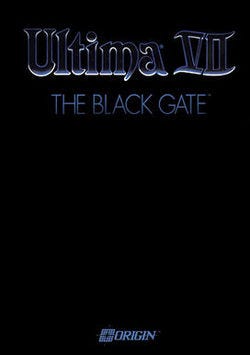New Worlds: How Games are Better than Movies for the Sci-Fi/Fantasy Genre
The problem with the worlds built by movies is that they inherently focus on a limited perspective. As a result, games create a much fuller world because they are forced to resolve all of these minor issues during the development process.

“Chaos and Order are not enemies, only opposites. Chaos and Order combined equal balance.”
Richard Garriott
Award winning video game designer of the Ultima series
I consider myself a big fan of science fiction and fantasy, but I’m a harsh critic when it comes to the worlds they try to build. I find myself enjoying standalone movies more often than the bigger production series because although they build smaller worlds, they have significantly less flaws. There are times I wish I could turn off my brain and just enjoy the action, but the plot holes can be so large that you could drive a truck through them. Sometimes the eccentric director or copyright issues are to blame, but the inconsistencies can originate from the writers themselves.
The problem with the worlds built by movies is that they inherently focus on a limited perspective. A particular background prop in a movie can be stunningly beautiful, but lacks depth (sometimes literally) because it’s unnecessary. The same prop in a game would require characteristics to support the possibility of players interacting with it. As a result, games, both tabletop as well as video, create a much fuller world because they are forced to resolve all of these minor issues during the development process.
Here Are the Rules
The rules that are inherent to a game are necessary for it to be good, but they also maintain a consistency with the story of the game’s world. Even when pseudo-science and magic is involved, they always have limitations such that the player can either overcome them or work around them by the end of the game. There is nothing more frustrating to a player than when rules that have been set and mastered over many hours to be instantly broken for the purposes of plot.
Imagine your superhero protagonist is instantly knocked out by a street thug despite all the game mechanics telling you that he and his ten friends could assault you all day without resulting in a scratch. We don’t expect ourselves to be invulnerable except for the fact that the game has specifically given us this reward for the past 30 hours of playing. Note that this is not about realism, as the writers/developers are allowed to redefine what’s real within their own game, but rather about consistency within the own ruleset they’ve built.

The Ultimate World
Open world games tend to be the most complete in this regard because developers know that their ruleset has to be rock solid in order for them to allow players to roam about and do whatever they want. One of the earliest open world games that felt full enough to warrant hours of off-trail exploration was Ultima 7 (1992). While the previous six iterations were already large and open worlds, the level of detail in both the graphics and objects that could be interacted with in the seventh easily doubled its predecessor. The consistency in the rules allowed for players to engage in the main storyline at their own pace and its difficulty was based on finishing side plots to prepare themselves. If you diverged so much that you could slay dragons, then the street thug that approaches you in the main storyline will be appropriately laughable.
Rule Breakers
One of the most fun things to do in the Ultima series was to use a cannon to blow up other objects. Simply put, a cannon could blow up virtually anything, including doors you normally would require a special key for and people that would otherwise be near invulnerable. The level of detail in Ultima 7 led to a lot more things you could shoot a cannon at with often hilarious results. It didn’t lead to the best long term experience, but it was a mechanic in the game that the developers left in for the purpose of fun, without breaking the consistency of the world.
Developers don’t have to give you these godlike powers, but if they do, having them function in a consistent manner is critical to the continuous flow of the game. Indeed, you could solve 90% of the problems by shooting a cannon in the right direction. Perhaps to show a deeper meaning, having ultimate destructive power in the form of a cannon (or the Armageddon spell) would generally not solve the core problems of the Ultima world.

Cannon on a magic carpet... awesome, yet still not game breaking
Our Choices Make Us
The completeness of the Ultima world also allowed you to make choices, most notably, the choice of being evil. The reactions of other characters to your actions added substantial amount of depth that would be impossible to see in a movie or TV show. Modern RPGs are now far ahead in this regard with their large voice acting and 3D modeling budgets that I’d go as far as to argue that the tutorial Act in Witcher 3 tells me more about that world and its people than all nine hours of The Hobbit trilogy of Middle Earth.
Telly Lee
Salad Hunters Inc.
@saladhunt
Read more about:
BlogsAbout the Author
You May Also Like









